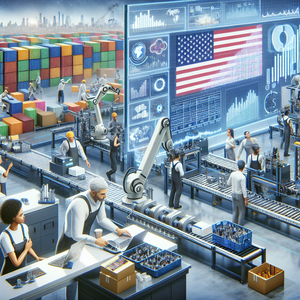
Bridging the Skills Gap: Unveiling Opportunities in Manufacturing Amidst Labor Challenges
In recent years, the manufacturing sector has faced a significant challenge: a widening gap between job openings and available skilled workers. This mismatch is not only due to rapid technological advancements but also the evolving nature of industry demands. Compounding these challenges is a perception problem, especially among younger generations who often see manufacturing as lacking in areas like work-life balance and career growth. The COVID-19 pandemic intensified these issues, leading to job losses and a slower recovery in filling positions. Current forecasts suggest that millions of manufacturing roles may remain vacant in the years to come. Yet, within these challenges lie vast opportunities for those equipped with the right skills and adaptability. Advanced manufacturing and logistics roles are on the rise, and there is a growing movement toward creating better training programs and career pathways to attract younger talent. While some predict a decline in manufacturing, others believe strategic interventions and rebranding efforts could revitalize interest. This article delves into various roles within the sector, showcasing how they contribute to overcoming workforce challenges and highlighting the tasks and skills required to thrive.
Job Summaries:
Manufacturing Engineer:
- These professionals are crucial in designing and improving manufacturing processes, thereby enhancing product quality and efficiency.
- Their work not only streamlines operations but also reduces costs, easing transitions for less experienced workers.
- Typically, a bachelor's degree in engineering and expertise in CAD software are essential.
- The role offers a chance to drive process optimization and innovation, making a tangible impact on bridging the skills gap.
Production Supervisor:
- Tasked with overseeing daily plant operations
- Ensure that production meets quality and efficiency standards
- Play a key role in managing workforce dynamics
- Maximize productivity, particularly amidst labor shortages
- An associate's degree in a related field and strong leadership skills are typically required
- Ideal for those who thrive in fast-paced environments
Quality Control Inspector:
- Ensuring products meet established standards
- Quality Control Inspectors maintain high-quality outputs
- thereby enhancing the industry's appeal
- While a high school diploma and quality control certification are beneficial
- the role is pivotal in driving manufacturing excellence
CNC Machinist:
- CNC Machinists operate machines that produce precision parts.
- They adapt manufacturing processes to technological advances.
- The role requires technical training and strong math and mechanical skills.
- This role is at the forefront of manufacturing technology.
Industrial Maintenance Technician:
- These technicians ensure machinery operates efficiently, maintaining and repairing equipment to support the production process.
- A technical diploma and problem-solving skills are essential, making this role critical in keeping manufacturing facilities running smoothly.
Supply Chain Analyst:
- By optimizing supply chains, Supply Chain Analysts enable manufacturers to respond more agilely to market demands and workforce challenges.
- A bachelor's degree in supply chain management and strong analytical skills are required.
Manufacturing Operator:
- Serving as a gateway into the industry, Manufacturing Operators handle machinery and equipment, offering entry-level opportunities that help address labor shortages.
- A high school diploma and on-the-job training are typically sufficient.
Process Improvement Specialist:
- These specialists focus on enhancing manufacturing efficiency and quality, helping manufacturers maximize workforce potential amid labor shortages.
- A bachelor's degree and experience in Lean or Six Sigma methodologies are needed.
Logistics Coordinator:
- Logistics Coordinators ensure smooth operations
- Helping manufacturers meet production targets despite workforce challenges
- A degree in logistics and strong organizational skills are needed
- Playing a vital role in the manufacturing supply chain
Assembly Line Worker:
- Offering crucial entry points for new workers
- Assembly Line Workers assemble parts and products
- helping fill the labor gap
- A high school diploma and on-the-job training are provided
Manufacturing Planner:
- By optimizing production schedules, Manufacturing Planners better utilize available workforce resources, addressing labor shortages.
- A degree in business or engineering and strong planning skills are required.
Technical Sales Representative:
- Driving sales of manufacturing products
- Support sector growth
- Creating more job opportunities
- A background in engineering is beneficial
- Strong communication skills are beneficial
Industrial Designer:
- Creating innovative product designs
- Industrial Designers attract new talent by showcasing the creative side of manufacturing
- A degree in industrial design and technical skills are required
Environmental Health and Safety Specialist:
- Ensuring compliance with health and safety regulations
- Maintain safe working environments
- Enhancing job appeal
- A degree in occupational health and safety is required
- Relevant certification is required
Robotics Technician:
- As manufacturing automation increases, Robotics Technicians are crucial in integrating new technologies and attracting tech-savvy workers.
- Technical training and problem-solving skills are essential.
The manufacturing industry stands at a crossroads, where addressing workforce challenges with strategic efforts can lead to a thriving sector. By investing in training and rebranding manufacturing careers, companies can close the skills gap and remain competitive. With the right approach, the sector holds promise for those eager to embrace new opportunities and drive the future of manufacturing. Explore current job openings and discover your place in this dynamic field.
Explore More Jobs

